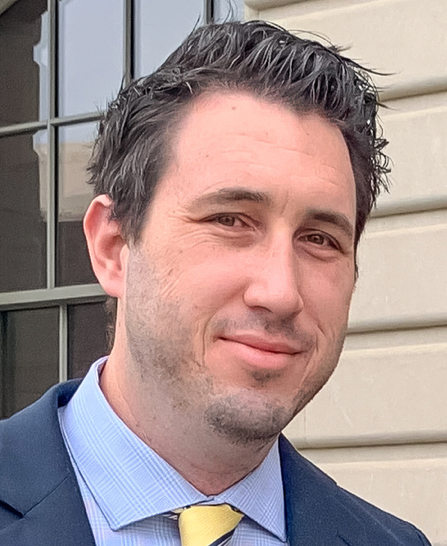RICHMOND, Virginia – A Raleigh County family court judge has filed her brief with the Fourth Circuit Court of Appeals seeking to have a lower court ruling reversed in a case where she searched a man’s home following a post-divorce contempt hearing.
Attorneys for Judge Louise Goldston filed the brief October 21 with the appeals court. That followed them filing the appeal in July after U.S. District Judge Frank Volk issued an order denying Goldston’s claim of judicial immunity and scheduled the trial to begin July 19.
Because the case involves judicial immunity, it can be appealed before the trial begins. A defendant usually must wait until a trial is finished to appeal to a higher court. Matt Gibson, the man whose home Goldston searched, filed a response and a motion to dismiss Goldston’s notice of appeal as frivolous.

Bryan
“The entire controversy revolves around a single, albeit unsimple, question,” Goldston’s Fourth Circuit brief states. “Judges are immune from civil suits for damages – so, was Judge Goldston a judge in this scenario?
“The inescapable conclusion upon a review of the case record is that she was. While it can be argued that she exceeded her authority – and the Supreme Court held as much … – issuing an ultra vires order does not remove a judge from the protections of absolute judicial immunity.”
Gibson’s attorney, John H. Bryan, has until mid-November to file his brief with the Fourth Circuit.
“Defendant Goldston’s Notice of Appeal is little more than tactical attempt to dislodge the imminently scheduled trial date, mere days away from this frivolous filing,” Bryan wrote in Gibson’s response this summer. “She asserts judicial immunity on the basis of factual issues, rather than on abstract legal theory.
On March 4, 2020, Goldston stopped a court hearing and ordered the parties to meet at Gibson’s house to search and to seize items Gibson allegedly failed to turn over to his ex-wife following their 2019 divorce. When Gibson protested, Goldston threatened to jail him for contempt. The incident was recorded on a smartphone, and it soon appeared online.
Goldston was reported to the state Judicial Investigation Commission, which charged her with violating the state Code of Judicial Conduct.
Goldston has served as a family court judge since 1994, and she presides over cases in Raleigh, Summers and Wyoming counties. Before this, she never had been disciplined for judicial misconduct. But she did admit she had a 20-year practice of going to parties’ homes “to either determine if certain disputed marital property was present and/or to supervise the transfer of disputed property.”
In March 2021, Gibson filed the federal lawsuit against Goldston as well as the Raleigh County Commission and three sheriff’s deputies related to the incident. That was the same month the Judicial Hearing Board issued its recommended decision to the state Supreme Court regarding Goldston’s actions after she had been charged with violating at least seven rules in the Code of Judicial Conduct after admitting she visited homes of litigants to check on disputed property.
Volk also addressed Goldston’s arguments that she was merely holding a Family Court hearing inside Gibson’s home, and that she should be immune from liability.
“The crux of Judge Goldston’s argument is that her actions were taken during the course of adjudicating a family court dispute,” he wrote. “She contends that, assuming she exceeded her authority, her actions were judicial in nature and hence subject to judicial immunity.
As noted, the court examines the nature of the act and not the actor. The nature of the act was a warrantless search of Mr. Gibson’s residence and a warrantless seizure of his property. The twofold inquiry is (1) whether a search of a residence was an act normally performed by a judge, and (2) the expectations of the parties, namely, whether Mr. Gibson was dealing with Judge Goldston in her judicial capacity.”
Volk said Goldston was not engaged in an act normally performed by a judge.
“Respecting the second prong, Mr. Gibson doubtless dealt with Judge Goldston in her judicial capacity at the outset of the March 4 contempt hearing,” Volk wrote. “The situation changed markedly, however, once the field trip began. Once Judge Goldston invited herself to the residence, began her warrantless search, and then seized private property, the die was cast. Nevertheless, Judge Goldston notes (1) a bailiff was in attendance, (2) the search was recorded much like a judicial proceeding, and (3) Mr. Gibson and his ex-wife made motions during the process. She asserts all of this demonstrates the parties dealt with her as a judge.”
Volk said those contentions “do not withstand minimal scrutiny.”
“Mr. Gibson’s motion for disqualification arose out of Judge Goldston acting as a witness rather than a judge,” Volk wrote. “Further, the recording of the search — which Judge Goldston attempted to halt — is in no way equivalent factually or legally to an electronically transcribed or recorded judicial proceeding.
“Judge Goldston recognized as much in her deposition. Judge Goldston has thus failed to demonstrate either of the two required prongs.”
Volk also said the Raleigh County Commission is going to trial on the issue of whether the sheriff’s office adopted and maintained a policy of illegal family court judicial searches of litigants’ homes.
In September 2020, the state Judicial Investigation Commission filed its formal statement of charges with the Supreme Court against Goldston.
Gibson, a federal law enforcement officer, is being represented by Bryan, a civil rights attorney from Union. Goldston is being represented by Adam Strider, Jennifer Tully and John Fuller of Bailey & Wyant in Charleston. The Raleigh County Commission is being represented by Victor Flanagan and Kevin Robinson of Pullin Fowler Flanagan Brown & Poe in Charleston.
Fourth Circuit Court of Appeals case number 22-1757 (U.S. District Court for the Southern District of West Virginia case number 5:21-cv-00181; and West Virginia Supreme Court of Appeals case number 20-0472)
